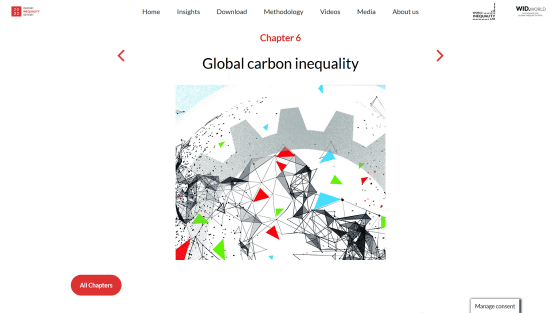Carbon emitted in a single space trip exceeds the lifetime of low-emission people

2021 was a year of active civilian space travel, with a total of more than 20 people realizing space travel. While further hopes for future space development are increasing, the
The World #InequalityReport 2022: Global carbon inequality
https://wir2022.wid.world/chapter-6/

Jeff Bezos'Space Trip Emitted Lifetime's Worth of Carbon Pollution
https://gizmodo.com/jeff-bezos-space-joyride-emitted-a-lifetime-s-worth-of-1848196182
One Space Trip Emits a Lifetime's Worth of Carbon Footprint
https://futurism.com/space-trip-lifetime-carbon
2021 is also known as the 'first year of space travel,' and in July 2021, Virgin Galactic founder Richard Branson and others succeeded in space travel by civilians, and a few days later Jeff. ・ Blue Origin, led by Mr. Bezos, made a space trip of four civilians including Mr. Bezos. Since then, civilians have realized space travel one after another, and in December, businessman Yusaku Maezawa boarded the Russian spacecraft Soyuz MS20 and launched it, and at the time of writing the article, the International Space Station (ISS) ) Is staying.
'Everything is moving every day' Yusaku Maezawa on a space trip | NHK News
https://www3.nhk.or.jp/news/html/20211214/k10013387831000.html
However, the Institute for Global Inequality wrote in a report on global inequality: 'Global income inequality creates a disparity in per capita carbon dioxide emissions, and carbon dioxide is a way to deal with climate change. Emissions inequality should also be addressed. ' 'Perhaps the most prominent depiction of the extreme environmental pollution associated with wealth inequality in recent years is the development of space travel,' he said.
Regarding space travel, the World Institute for Inequality said, 'Given indirect emissions, an 11-minute flight emits more than 75 tonnes of carbon per passenger (and can actually reach 250-1000 tonnes). At the other end of the distribution, about 1 billion people emit less than 1 ton of carbon per person per year. These 1 billion people have more than 75 tonnes of carbon per person for life. So, in space travel, at least as much carbon as the bottom one billion people in their lifetime emits in just a few minutes. '
The graph below shows the annual carbon emissions per capita as 'Full population', 'Bottom 50%', 'Middle 40%', and 'Top 10%'. ) ”“ Top 1% (top 1%) ”. The average of the total population is 6.6 tons, the bottom 50% is 1.6 tons, the middle 40% is 6.6 tons, the top 10% emits a whopping 31 tons, and the top 1% emits 110 tons of carbon. And that.

In addition, the percentage of total carbon emissions is 'Bottom 50% (bottom 50%)', 'Middle 40% (middle 40%)', 'Top 10% (top 10%)', and 'Top 1% (top 1%)'. ) ”Is this the graph. The bottom 50% is 12%, the middle 40% is 40.4%, and more than 90% of people emit only about half of the total carbon, the top 10% emits 47.6%, and the top 1% emits 16.8% carbon. It seems that it is discharging.

The Institute for World Inequality did not name a specific space exploration company in its space travel estimates, but the term '11-minute flight' assumed the Blue Origin, which
Blue Origin claims that it is cleaner than Virgin Galactic because it uses liquefied hydrogen and liquefied oxygen as rocket fuel and the water it produces is released as water vapor. However, it has been pointed out that a large amount of energy is consumed to produce liquefied hydrogen and liquefied oxygen, and the fuel manufacturing stage is a carbon-intensive process. The estimate of '75 tons in an 11-minute flight' is based on the case of going to space and returning immediately, and if you have been in space for a long time after being launched, carbon emissions per hour will decrease. I will continue.

by NASA Flight Opportunities
The Institute for World Inequality argued that due to the existence of carbon emission disparities between rich and poor, climate change measures should be taken to eliminate this inequality.
Related Posts:
in Science, Posted by log1h_ik







